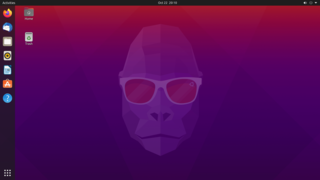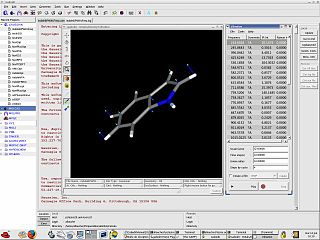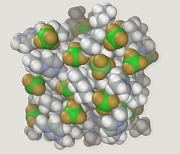| Written in | C++, C and FORTRAN 77 |
|---|---|
| Type | Computational chemistry |
| License | GNU General Public License |
| Website | www |
MPQC (Massively Parallel Quantum Chemistry) is an ab initio computational chemistry software program. [1] Three features distinguish it from other quantum chemistry programs such as Gaussian and GAMESS: it is open-source, has an object-oriented design, and is created from the beginning as a parallel processing program. [2] It is available in Ubuntu and Debian. [3] [4]
MPQC provides implementations for a number of important methods for calculating electronic structure, including Hartree–Fock, Møller–Plesset perturbation theory (including its explicitly correlated linear R12 versions), and density functional theory.

Advanced Package Tool, or APT, is a free-software user interface that works with core libraries to handle the installation and removal of software on Debian, Ubuntu, and related Linux distributions. APT simplifies the process of managing software on Unix-like computer systems by automating the retrieval, configuration and installation of software packages, either from precompiled files or by compiling source code.
Nanoscale Molecular Dynamics is computer software for molecular dynamics simulation, written using the Charm++ parallel programming model. It is noted for its parallel efficiency and is often used to simulate large systems. It has been developed by the collaboration of the Theoretical and Computational Biophysics Group (TCB) and the Parallel Programming Laboratory (PPL) at the University of Illinois at Urbana–Champaign.
Q-Chem is a general-purpose electronic structure package featuring a variety of established and new methods implemented using innovative algorithms that enable fast calculations of large systems on various computer architectures, from laptops and regular lab workstations to midsize clusters and HPCC, using density functional and wave-function based approaches. It offers an integrated graphical interface and input generator; a large selection of functionals and correlation methods, including methods for electronically excited states and open-shell systems; solvation models; and wave-function analysis tools. In addition to serving the computational chemistry community, Q-Chem also provides a versatile code development platform.
Psi is an ab initio computational chemistry package originally written by the research group of Henry F. Schaefer, III. Utilizing Psi, one can perform a calculation on a molecular system with various kinds of methods such as Hartree-Fock, Post-Hartree–Fock electron correlation methods, and Density functional theory. The program can compute energies, optimize molecular geometries, and compute vibrational frequencies. The major part of the program is written in C++, while Python API is also available, which allows users to perform complex computations or automate tasks easily.

Ubuntu is a Linux distribution based on Debian and mostly composed of free and open-source software. Ubuntu is officially released in three editions: Desktop, Server, and Core for Internet of things devices and robots. All the editions can run on the computer alone, or in a virtual machine. Ubuntu is a popular operating system for cloud computing, with support for OpenStack. Ubuntu's default desktop has been GNOME, since version 17.10.
Technical variations of Linux distributions include support for different hardware devices and systems or software package configurations. Organisational differences may be motivated by historical reasons. Other criteria include security, including how quickly security upgrades are available; ease of package management; and number of packages available.
Amsterdam Density Functional (ADF) is a program for first-principles electronic structure calculations that makes use of density functional theory (DFT). ADF was first developed in the early seventies by the group of E. J. Baerends from the Vrije Universiteit in Amsterdam, and by the group of T. Ziegler from the University of Calgary. Nowadays many other academic groups are contributing to the software. Software for Chemistry & Materials (SCM), formerly known as Scientific Computing & Modelling is a spin-off company from the Baerends group. SCM has been coordinating the development and distribution of ADF since 1995. Together with the rise in popularity of DFT in the nineties, ADF has become a popular computational chemistry software package used in the industrial and academic research. ADF excels in spectroscopy, transition metals, and heavy elements problems. A periodic structure counterpart of ADF named BAND is available to study bulk crystals, polymers, and surfaces. The Amsterdam Modeling Suite has expanded beyond DFT since 2010, with the semi-empirical MOPAC code, the Quantum_ESPRESSO plane wave code, a density-functional based tight binding (DFTB) module, a reactive force field module ReaxFF, and an implementation of Klamt's COSMO-RS method, which also includes COSMO-SAC, UNIFAC, and QSPR.

Ghemical is a computational chemistry software package written in C++ and released under the GNU General Public License. The program has graphical user interface based on GTK+2 and supports quantum mechanical and molecular mechanic models, with geometry optimization, molecular dynamics, and a large set of visualization tools. Ghemical relies on external code to provide the quantum-mechanical calculations — MOPAC provides the semi-empirical MNDO, MINDO, AM1, and PM3 methods, and MPQC methods based on Hartree–Fock calculations.
Open Babel is computer software, a chemical expert system mainly used to interconvert chemical file formats. Due to the strong relationship to informatics this program belongs more to the category cheminformatics than to molecular modelling. It is available for Windows, Unix, Linux, macOS, and Android. It is free and open-source software released under a GNU General Public License (GPL) 2.0.
PulseAudio is a network-capable sound server program distributed via the freedesktop.org project. It runs mainly on Linux, various BSD distributions such as FreeBSD and OpenBSD, macOS, as well as Illumos distributions and the Solaris operating system. Microsoft Windows was previously supported via MinGW. The Windows port has not been updated since 2011, however.

Gabedit is a Graphical User Interface to GAMESS (US), Gaussian, MOLCAS, MOLPRO, MPQC, OpenMopac, PC GAMESS, ORCA and Q-Chem computational chemistry packages.
Materials Studio is software for simulating and modeling materials. It is developed and distributed by BIOVIA, a firm specializing in research software for computational chemistry, bioinformatics, cheminformatics, molecular dynamics simulation, and quantum mechanics.

Molecular modeling on GPU is the technique of using a graphics processing unit (GPU) for molecular simulations.

Ascalaph Designer is a computer program for general purpose molecular modelling for molecular design and simulations. It provides a graphical environment for the common programs of quantum and classical molecular modelling ORCA, NWChem, Firefly, CP2K and MDynaMix . The molecular mechanics calculations cover model building, energy optimizations and molecular dynamics. Firefly covers a wide range of quantum chemistry methods. Ascalaph Designer is free and open-source software, released under the GNU General Public License, version 2 (GPLv2).
AutoDock is molecular modeling simulation software. It is especially effective for protein-ligand docking. AutoDock 4 is available under the GNU General Public License. AutoDock is one of the most cited docking software applications in the research community. It is a base for the FightAIDS@Home and OpenPandemics - COVID-19 projects run at World Community Grid, to search for antivirals against HIV/AIDS and COVID-19. In February 2007, a search of the ISI Citation Index showed more than 1,100 publications had been cited using the primary AutoDock method papers. As of 2009, this number surpassed 1,200.
GNU Gnubik or GNUbik is a puzzle game – a software implementation of the Rubik's Cube. It is cross platform and is included in all major operating systems including Debian, openSUSE, GuixSD, Red Hat and Ubuntu.

Quantum ESPRESSO is a suite for first-principles electronic-structure calculations and materials modeling, distributed for free and as free software under the GNU General Public License. It is based on density-functional theory, plane wave basis sets, and pseudopotentials. ESPRESSO is an acronym for opEn-Source Package for Research in Electronic Structure, Simulation, and Optimization.
PySCF is an ab initio computational chemistry program natively implemented in Python program language. The package aims to provide a simple, light-weight and efficient platform for quantum chemistry code developing and calculation. It provides various functions to do the Hartree–Fock, MP2, density functional theory, MCSCF, coupled cluster theory at non-relativistic level and 4-component relativistic Hartree–Fock theory. Although most functions are written in Python, the computation critical modules are intensively optimized in C. As a result, the package works as efficient as other C/Fortran-based quantum chemistry program. PySCF is developed by Dr. Qiming Sun.
Guvcview is a webcam application, i.e. software to handle UVC streams, for the Linux desktop, started by Paulo Assis in 2008. The application is written in C and is free and open-source software released under the GNU General Public License.